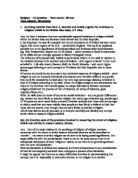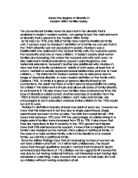Describe and briefly explain the variations in religious beliefs in the British Isles today.
Percentages
Type of belief
Great Britain
Irish republic
Northern Ireland
Believe in God
69
95
95
Believe God is personally concerned
37
77
80
Believe the Bible is the 'actual' or 'inspired word of God'
44
78
81
% Believing in:
Life after death
Heaven
Hell
The Devil
Religious miracles
55
54
28
28
45
80
80
53
49
73
78
78
74
69
77
This table shows the variation of religion throughout the British Isles. It is presented as a percentage of the population.
Looking at this table, shows that there is little presence of religion within Great Britain opposed to both Northern and the Republic of Ireland, as only 69 percent of the Great Britain population are believers of God. This is relatively small compared to the Irish 95 percent.
The variation between the British Isles is sustained throughout the table, suggesting that Great Britain have the lowest rate of religion and both the Republic and Northern Ireland average to have the highest.
There are many reasons why such variations take place within the British Isles, such as; gender differences, social class, ethnicity, and new religious movements.
Gender has a major influence upon the religious beliefs of the British Isles population. Most of the religious denominations and Trinitarian churches endorse patriarchy within society (feminist view only) and believe it is an instrument of dominance and oppression. This view on religion is shared by both Marxist and Feminist groups.
Sociologists such as Karen Armstrong argue that the early history of religion shows that women were considered to be central to a spiritual quest. Therefore proving that women have not always been looked upon as a subordinate group by religion and therefore stating that religion does not condone patriarchy.
Social class is another important aspect of the variation of religion, within the British Isles. Religion can be looked upon as having an economic character; it is related to different socio-economic classes which all use religion in different ways.
Percentages
Type of belief
Great Britain
Irish republic
Northern Ireland
Believe in God
69
95
95
Believe God is personally concerned
37
77
80
Believe the Bible is the 'actual' or 'inspired word of God'
44
78
81
% Believing in:
Life after death
Heaven
Hell
The Devil
Religious miracles
55
54
28
28
45
80
80
53
49
73
78
78
74
69
77
This table shows the variation of religion throughout the British Isles. It is presented as a percentage of the population.
Looking at this table, shows that there is little presence of religion within Great Britain opposed to both Northern and the Republic of Ireland, as only 69 percent of the Great Britain population are believers of God. This is relatively small compared to the Irish 95 percent.
The variation between the British Isles is sustained throughout the table, suggesting that Great Britain have the lowest rate of religion and both the Republic and Northern Ireland average to have the highest.
There are many reasons why such variations take place within the British Isles, such as; gender differences, social class, ethnicity, and new religious movements.
Gender has a major influence upon the religious beliefs of the British Isles population. Most of the religious denominations and Trinitarian churches endorse patriarchy within society (feminist view only) and believe it is an instrument of dominance and oppression. This view on religion is shared by both Marxist and Feminist groups.
Sociologists such as Karen Armstrong argue that the early history of religion shows that women were considered to be central to a spiritual quest. Therefore proving that women have not always been looked upon as a subordinate group by religion and therefore stating that religion does not condone patriarchy.
Social class is another important aspect of the variation of religion, within the British Isles. Religion can be looked upon as having an economic character; it is related to different socio-economic classes which all use religion in different ways.







